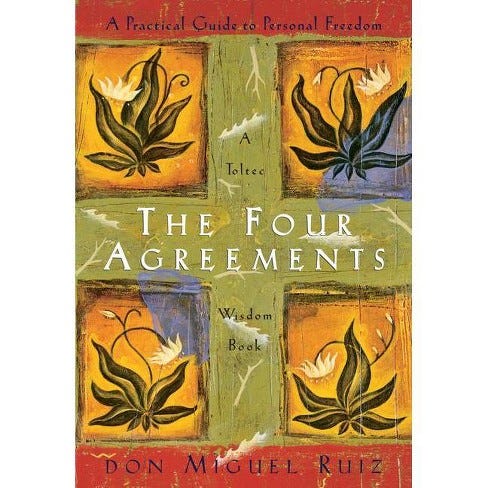Volume 2
Why You Want To Read This
The Four Agreements by Don Miguel Ruiz
Amber-Allen Publishing, 1997
Miguel Ruiz’s classic The Four Agreements is short and easy to read. It is also a distillation of several concepts relevant to Mental Fitness. If each of us truly absorbed and practiced The Four Agreements, we would greatly expand our peace of mind and experience a positive ripple effect in our lives. The following is my summary, and how these ideas relate to singers’ Mental Fitness.
A shaman in the Toltec tradition, Ruiz’s writing style is folksy and oddly relaxing in its repetitiveness. There is conventional religious terminology throughout: heaven, hell, God, sin, and some Bible references, as well as mentions of magic, both black and white. If any of this offends you, I urge you to look past your resistance to the value of each Agreement, and how it might serve you.
In Chapter 1, Ruiz says that we are all “dreaming without awareness”, that we live in a sort of fog that keeps us from knowing our true selves. This is because each of us was “domesticated” as children by the beliefs of those around us - family, teachers, religious figures - and that this process goes on from one generation to the next. Our need to belong and feel safe is instinctual, so naturally we take these belief systems as Truth.
Conflict comes from trying to live by a set of rules that we cannot fully know - the rules are not ours; we did not choose them. We feel shame, guilt, a sense of failure, and fear of isolation. We punish ourselves over and over for the ‘‘mistakes’’ we make from not knowing the rules. Additionally, society has its own “dream” - a fear-based nightmare. The proof is all around us: injustice, poverty, violence, war, oppression.
“Our personal power is dissipated by all the agreements we have created,
and the result is that we feel powerless” ~Ruiz
But Ruiz states at the end of the chapter we can trade the hellscape for our “personal dream of heaven” by adopting The Four Agreements.
The First Agreement: Be Impeccable with Your Word
“Speak with integrity. Say only what you mean. Avoid using the word to speak against yourself or to gossip about others. Use the power of your word in the direction of truth and love.”
When we understand the power of words, we can choose to use that power carefully or recklessly. Speaking with awareness and compassion, we uplift rather than destroy. We add all manner of goodness to the world, rather than subtracting from it. The author tells us that the First Agreement is both the hardest to fully implement and the one from which the other three stem.
To illustrate, Ruiz uses the stark example of Nazism. With words, Hitler activated people’s fears and much of the world became engulfed in terror and war. Humans destroyed one another on a colossal scale. The degree of inhumanity inspired by one man’s lies is difficult to fathom. And yet, Hitler’s insidious ideology survives to this day.
But words also have the power to build, uplift, and heal. The words of Martin Luther King Jr’s “I Have a Dream” speech helped inspire the passing of landmark anti-discrimination legislation, and continues to be a call for racial equality. Mahatma Mohandas Gandhi led a movement that overturned 200 years of devastating British colonialism by convincing people to use satyagraha, or “truth force”, instead of physical force.
Since words can clearly affect global events, it isn’t hard to imagine their impact on individual lives. How does the power of the word show up in a singer’s life?
When a trusted mentor is either careless or generous with their words, the effect can be dramatic and long-lasting. As singers it is our job to take in information - filter, sort, apply - and magically produce something new. If our voice, intellect, character, physique, etc., is labeled too this or too that, we might enter into an Agreement that isn’t of our choosing.
Singers must also take seriously the responsibility not to use words against themselves or others. There is intricate psychology that explains why we belittle ourselves (a subject for future Newsletters), but for now let us understand that self-inflicted insults are profoundly harmful. And when we speak against others we reveal our insecurities and low self-esteem.
Q: What examples from your life illustrate the First Agreement?
The Second Agreement: Don’t Take Anything Personally
“Nothing others do is because of you. What others say and do is a projection of their own reality, their own dream. When you are immune to the opinions and actions of others, you won't be the victim of needless suffering.”
This is worth repeating: Nothing others do is because of you, but is a projection of their own reality. When we take things personally we are assuming we are at the center of everything, and that everyone sees the world as we do. If we are all doing this the result is confusion and conflict and misery. We become offended when others' behavior doesn’t reflect our beliefs. This is normal for a developing child, but as functioning adults we must grow beyond this self-oriented mindset.
When someone treats us badly - insults and name-calling, dismissiveness and disrespect, harassment and abuse - that person is suffering and unable to regulate themselves, the same process as a toddler throwing a tantrum. The cause of their behavior is within. Understanding this enables us to stay in our own reality, to avoid taking responsibility for someone else's choices, and to take actions that best support our own well-being.
Q: When you take something personally, how does that feel?
How does it feel when someone takes something you say personally?
The Third Agreement: Don’t Make Assumptions
“Find the courage to ask questions and to express what you really want. Communicate with others as clearly as you can to avoid misunderstandings, sadness, and drama. With just this one agreement, you can completely transform your life.”
Not unlike the Second Agreement, Don’t Make Assumptions reminds us not to get stuck in our own reality. When we make assumptions about people we are caught in a cognitive distortion called Mind Reading. Like it sounds, Mind Reading means we simply decide we know what someone is thinking without supporting evidence. An arbitrary interpretation, assumption is a kind of mental shortcut. Reading non-verbal and social cues is useful human behavior, but stating that the director hates you because they didn’t cast you in the show implies that you know the mind of another person. A related cognitive distortion, Fortune Telling, is when we assume we know in advance the result of a circumstance or event. For instance, “My audition is going to suck.”
Making up stories, jumping to conclusions, mind reading, fortune telling, and making assumptions - all based on either insufficient or incorrect data - increases anxiety and depression, and harms relationships. Instead, strive to understand, to ask questions, to communicate clearly before interpreting.
Q: What do you tend to make assumptions about?
The Fourth Agreement: Always Do Your Best
“Your best is going to change from moment to moment; it will be different when you are healthy as opposed to sick. Under any circumstance, simply do your best, and you will avoid self-judgment, self-abuse, and regret.”
This Agreement, Ruiz states, is “the one that allows the other three to become deeply ingrained habits.” Under every circumstance we strive to do our very best and understand that it will change from day to day, and even moment to moment.
Ruiz also encourages us to do our best, no more and no less. We tend to understand what no less means: don’t phone it in, be intentional, really try. But what about no more? I remind my students that we are not robots, we are human beings, hoping they will begin to manage expectations. Pushing beyond our capacity leads us “to frustration, self-judgment, guilt, and regrets.” When doing our best - whatever that means in this moment - becomes the goal rather than achieving a reward or outcome, we motivate ourselves intrinsically, creating more balance between external and internal influences. Enhanced creativity, learning, performance, and well-being is the result.
Beware of making excuses to avoid expending the required energy and commitment to do your best. A performer who justifies a lack of effort with an excuse like, “Oh well, it’s only a matinee”, lacks esteem for themselves, their audience, and their craft.
Q: How likely are you to accept your best, regardless of circumstances?
Don Miguel Ruiz’s The Four Agreements provides much insight to propel us along our journey of personal growth. There is more to this compact book than the Agreements, and I urge you to read it in total. Personally, my favorite aspect is the continual encouragement to turn to love and connection. Each common-sense Agreement is simple to understand but more complicated to implement. However, gaining awareness is always the first step in making change.
If you have read this far, you are either my mom (Hi, Mom!) or you are already doing the work to augment your well-being and strengthen your Mental Fitness.
What are your take-aways from The Four Agreements by Don Miguel Ruiz?









